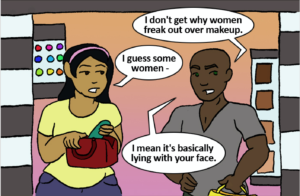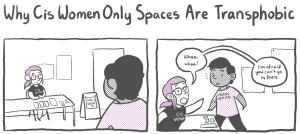It’s a go-to romcom staple: Boy likes girl, but girl doesn’t like him back. The determined boy will then spend the movie trying to convince the girl to give him a chance.
Our “hero” will go to great lengths to win the affection of his crush, whether that means repeatedly asking her out, leaving her gifts, or even infiltrating her circle of friends.
Finally, the boy pulls a Grand Romantic Gesture and seals the deal with his formerly (and sometimes still) reluctant love interest.
The audience is meant to cheer on the boy for his persistence and view any remaining resistance on the part of the girl as simply delaying the inevitable.
As long as love, or what we think is love, triumphs in the end, nothing else matters.
Which brings me to an obvious question: Why do we perceive such scenarios as romantic or anything other than creepy as hell?
Much of the behavior that we are conditioned to view as romantic is actually stalking behavior.
Red flags can be difficult to recognize because TV and film teaches us that invading someone’s privacy is cute, funny, and even expected when you’re infatuated with them.
They also teach us that when someone says no, they’re just playing hard to get. They don’t actually know what they want. “No” never really means “no” in the world of television.
Before we talk about the problematic ways in which media makes stalking seem allegedly harmless, let’s discuss some of the basics of stalking.
Stalking 101
Stalking is defined as “when a person repeatedly watches, follows, or harasses you, making you feel afraid or unsafe.”
Some examples of stalking behavior include showing up at your home or workplace unannounced, leaving unwanted gifts or items, sending unwanted phone calls or text messages, and waiting for you at places they know you frequent.
7.5 million people are stalked every year in the United States. 15% of women and 6% of men have been victimized by stalking.
Most victims of stalking are stalked by someone they know, with 61% of female victims and 44% of male victims stalked by a former intimate partner.
In Hollywood, stalking is only named as such in extremely dramatized situations, like a shadowy figure crouching outside your window. In reality, stalking takes many different forms.
Given the ubiquitous nature of cell phones and social media, if anything, we’re encouraged to see certain levels of stalking as commonplace – and even expected.
There’s pressure on potential victims to stop being so uptight because privacy invasion has become a way of life.
If you find yourself in a situation where you think you are being stalked, there are several precautions you can take. It’s important to trust your instinct and take threats seriously.
Do not contact your stalker or respond to their attempts to contact you. Keep evidence of the stalking – such as notes, text messages, and e-mails – and record the date, time, and place of stalking incidents.
Contact a crisis hotline and develop a safety plan, which could include changes to your routine, finding a new place to stay, or choosing to have a friend or relative accompany you during outings.
Consider contacting the police and taking out a protection order. Most importantly, if you feel like you’re in immediate danger, call 911 right away.
If someone you know is being stalked, be sure to validate their experiences and concerns and let them make their own choices.
Support them, but also find someone else that you can talk to about the situation.
Social Media Stalking
Think about how casually we throw around the term “Facebook stalking.” It’s become commonplace to look up someone’s Facebook account.
Even employers and recruiters search out the social media pages of their applicants to make sure they haven’t done anything unsavory.
On the surface, it seems pretty innocuous. You’re excited about a new crush, or maybe you want to see what your friend was up to last night.
You might go through some of their pictures or check out some of their new friends.
However, the proliferation of social media has increasingly blurred the lines of privacy and made it that much easier for stalkers to access your personal information.
Sites like Twitter and Facebook have become so instrumental to stalkers that spreading false rumors about someone through social media is a form of stalking in its own right.
In addition, stalkers can create fake profiles fairly easily so that their victims are unaware that they’re being monitored.
Social media and cyberbullying have become weapons of choice for stalkers, leading to terrifying and deadly results. Abusive partners track the location of their partners to hunt them down.
Additionally, there’s been a rash of youth suicides linked to cyberbullying over the past several years.
We need to pay serious attention to online threats.
Social media can foster a scary environment of anonymity in which victims feel like they’re perpetually vulnerable.
If you’re concerned about protecting your privacy on social media websites, check out these tips.
Finally, let’s try to be a little more sensitive to those who have been victimized by social media stalking by phasing “[insert social media site here] stalking” out of casual slang.
It might be humorous to you, but it belittles the experiences and trauma of victims.
Stalking and Gender in Media
Portrayals of stalking differ widely across gender, as evidenced by the fact that we tend to have difficulty recognizing male behavior as consistent with stalking in the first place.
Romantic comedies are definitely most guilty of this – when a boy pursues a girl after she rejects him, we’re supposed to perceive it as charming and sympathize with the male character.
The girl in the scenario is pigeonholed as snobby or oblivious if she ignores his advances.
“Nice guy” logic is clearly at work here. The boy allegedly deserves the girl simply because he likes her and is actively working to win her over, regardless of how the girl feels.
Remember (500) Days of Summer – the hipster cult classic in which we follow Tom’s inability to get over his obsession with his ex-girlfriend Summer, whom he imagines as his personal Manic Pixie Dream Girl?
Many people continue to hold up the film as a quirky tribute to the ups and downs of modern romance, viewing Tom as a hopeless romantic victimized by Summer’s fickle ways.
In reality, Tom is just another annoying ex who projected unhealthy fantasies onto a girl rather than getting to know her as a person.
The actor himself has stated that he finds the majority’s interpretation of the film troubling.
Meanwhile, if a girl relentlessly pursues a guy, she’s portrayed as unstable and pathetic.
Her romantic persistence robs her of her femininity and makes her downright undesirable. The audience is meant to view her as a joke or just plain creepy.
Rather than fully developing these characters or deconstructing the situation, we’re taught to just laugh at her and wonder why she’s so desperate and can’t take a hint.
Our discomfort with female suitors often stems from the fact that the guy has already rejected her point blank or clearly stated his lack of attraction to her.
Notice the double standard?
There is an incredibly relevant quote from Gavin De Becker that says, “When a man says no, it’s the end of discussion. When a woman says no, it’s the beginning of negotiation.”
We respect a man’s decision when he says no to a woman, but when a woman rejects a man, it’s merely seen as a challenge for him to overcome.
In a man’s mind, a woman’s rejection is a minor technicality. “No” is just a signal for him to work harder.
He’s now even more determined to win her over. He’s still going to get what he wants, regardless of how she feels about it.
Disassociating Romantic Behavior from Stalking Behavior
The media’s effect on how we perceive relationships is as significant as it is worrisome.
Troublingly, girls learn to interpret potential red flags of stalking and abuse as romantic or just “boys being boys.” Conversely, boys learn that such behavior is not only to be expected, but will be rewarded.
Having someone throw rocks at your window or leave heart-shaped notes in your locker or whatever other cheesy movie trope they use is not romantic if it involves someone that you’ve already turned down.
It’s creepy at best – and scary at worst.
Even if a girl maintains resolve not to date the guy in question, she’s supposed to view the behavior as endearing or flattering. It’s not.
Girls are not obligated to reciprocate a guy’s feelings or even interact with him just because he made an effort.
If he cares more about forcing you into a relationship than respecting your decision or your boundaries, that’s a sign of his entitlement complex at work. It’s about proving that he deserves to possess you.
That’s not okay, because it dehumanizes you and makes you an object for consumption.
Men need to learn that the world doesn’t revolve around their feelings. If she says no, it doesn’t mean she’s playing hard to get or she’s a heartless friendzoning witch. She’s just not interested.
People get rejected all the time. Women don’t owe men shit.
We also need to talk about women who won’t take no for an answer. It’s important that we stop portraying women’s infatuation as harmlessly delusional or just annoying.
Women are just as capable of threats and violence, and we shouldn’t trivialize the experiences of male victims under the assumption that women can’t be predatory.
Contrary to what TV and movies would like you to believe, crushes and romance are not the be-all, end-all of life. You want to date someone who actually wants to be in a relationship with you and wants to get to know you as an individual.
Someone should fall in love with you, not their own idea of you. Don’t feel pressured into fulfilling someone’s fantasy of who they expect you to be and how they expect you to feel.
***
Media might make stalking seem comedic or commonplace, but in reality such behavior needs to be taken seriously.
Building healthy relationships is important. Completely bypassing someone’s boundaries and ignoring their lack of romantic interest certainly is not the foundation for a healthy relationship.
Having the audacity to violate someone’s privacy is not the mark of a lovable hero, but rather a sign of narcissistic selfishness and toxic behavior.
Don’t allow anyone to write off red flags of stalking as nice guy puppy love shenanigans or mundane social media snooping.
It’s long overdue for us to recognize stalking for what it is – a real and dangerous threat faced by millions. Know the signs so that you can keep yourself from doing it to others, hold your friends accountable when you notice them doing it, and protect yourself when it’s being done to you.
[do_widget id=”text-101″]
Erin Tatum is a Contributing Writer at Everyday Feminism. She’s a feminist, queer theory lover, and television enthusiast living in Pennsylvania. She is particularly interested in examining the representation of marginalized identities in media. In addition to Everyday Feminism, she’s also a weekly contributor to B*tch Flicks. Follow her on Twitter @ErinTatum91 and read her articles here.
Search our 3000+ articles!
Read our articles about:
Our online racial justice training
Used by hundreds of universities, non-profits, and businesses.
Click to learn more





















